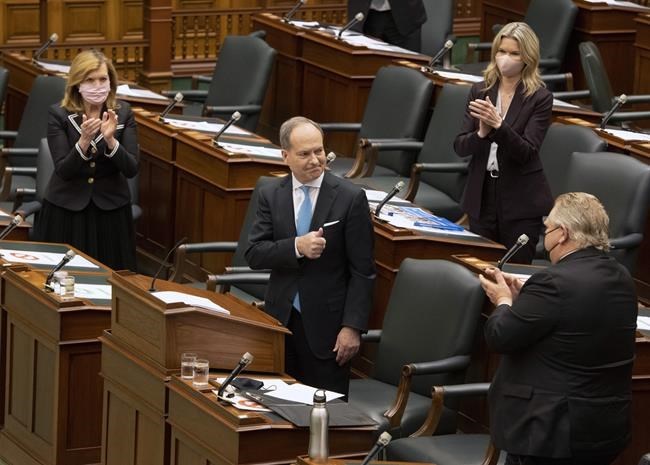TORONTO, Kan. — Ontario would have to significantly cut spending or hike taxes if it wants to eliminate its deficit earlier than planned, but it's unlikely the current Progressive Conservative government will do either, experts examining the province's newly released budget say.
That means Premier Doug Ford's plan to balance the books by 2029 will likely leave the challenge of placing the province back in the black to another leader, they say.
Thomas Klassen, a York University professor of public policy and administration, said the pandemic placed understandable pressure on the government to spend heavily in their $186-billion budget, which posted a $33.1 billion deficit.
"I think this year it just wouldn't have been possible, when everything is going on, for the government to say 'we're going to cut back spending or decrease any (services),'" he said.
"But in the future, that's going to have to happen,"
Ontario's 2021-2022 spending package laid out an eight-year path to achieve balance, relying on growth in the province's economy without significant spending cuts or tax hikes.
Finance Minister Peter Bethlenfalvy defended the plan to reach balance in 2029, saying the province's economy will rebound post-pandemic and help ease the borrowing burden.
"This level of debt, as I've said, is not sustainable in the long-term," he said Wednesday. "I'm really betting on the people of Ontario that will grow our economy when we get to the other side of this pandemic."
The long path to balance would mean the province is not expected to enter the black until a hypothetical third term under the Progressive Conservatives.
The budget projects Ontario will run a deficit of $33.1 billion this year, $26.2 billion next year and $18.7 billion in 2023-24, with the shortfalls ending in 2029-30 with a $900-million surplus.
Klassen said the long runway to return to the black will mean Ford will likely never achieve his 2018 election promise of balancing the province's books.
"It's very unlikely that the current premier will be the premier in nine years, or even the same party will be in power," he said. "It's going to come back to whoever is in power in the future, they're going to say ... 'Wow, we've got to pay this back'."
Klassen said he anticipates there will be pressure from financial institutions and within the Progressive Conservative government's own base to bring spending under control soon after the pandemic ends.
"It's ironic because the Conservatives came in with, especially for the first 12 months, a very strong priority to cut spending, And they did that," he said. "Then things changed. And it must be hard for the premier and the minister of finance to know they're going to borrow money and spend more."
Drew Fagan, a former deputy minister under a previous Liberal government who is now a public policy professor at the University of Toronto, said he is skeptical of Ontario's lengthy deficit reduction plan.
"The long-term trend is problematic," he said. "There's no immediate path to improving the fiscal balance."
Fagan said there's merit in the government's plan to grow the economy, thereby increasing tax revenues, as way to eliminate the deficit.
But if the Tories want to pursue that plan to balance the books, Fagan said they will need to be much more thoughtful and deliberate about how and where they grow the economy.
"We have a whole bunch of challenges in terms of slowing exports, weak productivity, low business investment, poor innovation, and that may not be the case in Toronto and the GTHA, Waterloo or Ottawa ... but it is particularly the case anywhere else," he said. "
"We've got to do what we can to equalize things and boost growth."
Meanwhile, other critics of the budget said it fails to meet the immediate needs of residents and small businesses struggling through the pandemic.
The budget includes $6.7 billion in pandemic spending, including $1 billion for the provincial vaccination effort and $2.3 billion for contact tracing and testing.
The government will offer a second round of grants to small businesses to help with pandemic expenses, create a new job training tax credit and provide more benefits to families with children.
But opposition critics, unions and other stakeholders said supports for people are too slow, insufficient or nonexistent.
Catherine Fife, the NDP's finance critic, said business grants didn't expand to more sectors and left out a large number of small businesses that employ many Ontarians.
"If there was ever a budget in the history of this province to invest in people, in businesses, this was the one, and this government missed the mark," Fife said.
The Canadian Union of Public Employees said the budget is a missed opportunity that makes more promises to help businesses than struggling workers.
“This budget is just classic trickle-down economics and it’s the last thing communities need,” CUPE Ontario President Fred Hahn said, also pointing to the lack of paid sick days.
This report by The Canadian Press was first published March 25, 2021.
Shawn Jeffords, The Canadian Press



